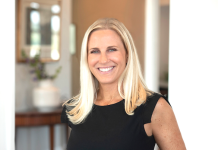By Mary Ann Bourbeau
John Lloyd witnessed firsthand how to make the best of a bad situation, and to keep a positive outlook while doing it. Despite his father’s death when he was 17, his mother, a medical secretary, managed to put Lloyd and his brother through Princeton University.
“We didn’t have much in the way of funds or resources, but we got grants and loans,” he said. “We were living in a garage apartment behind someone’s house in Philadelphia. But we were happy as can be because of my mother. I still get chills when I think about it. She was an unbelievable role model.”
That positive attitude and can-do spirit has followed Lloyd his whole life, from his nomadic childhood as an Army brat to his current job as president and CEO of Meridian Health, a $1.8 billion nonprofit health system comprised of six hospitals and more than 100 partner companies.
“I love people and I believe in them,” he said. “I’m successful because of the people I have. You can give me the worst situation; just let me pick my people.”
As a child, Lloyd lived with his family in Oklahoma, Kansas, Texas, New York and Maryland, moving every two or three years, whenever his father received an order to be stationed somewhere else.
“It never bothered me,” he said. “It was just our way of life. I was sad to leave, but happy to meet new people.”
While the family was living on Staten Island, Lloyd attended the Peddie School, a private boarding school in Hightstown. From there, he went on to Princeton University, taking liberal arts and religion classes, and joining the school’s ROTC program, because he wasn’t sure what field he wanted to go into. After graduation, he spent three years in the Marines.
“I grew up in that environment,” he said of the military. “I’m also very patriotic and I wanted to serve my country.”
By this time, Lloyd was married to the daughter of a renowned ophthalmologist, who urged his son-in-law to pursue a career in health care management.
“He saw my personality and drive and he thought I would do great in that field,” he said. “I was eager to learn why he thought that.”
So Lloyd enrolled at Temple University’s business program, earning an MBA with a major in hospital administration.
“I thought if I didn’t like health administration, I could always use my MBA,” he said.
In 1972, he started out as an administrative resident at Episcopal Hospital in Philadelphia, and with his high energy and keen business sense, he quickly moved up the ladder. “I loved it almost from the first day,” he said. “I was fascinated by health care, by the complexity of what it takes to deliver good care. There’s a purpose to what you’re doing – improving care. It’s a very rewarding career.”
Within 15 months, he was promoted to vice president, and in 1982, at the age of 36, he was named president of Jersey Shore Medical Center in Neptune.
“There were a number of challenges there and a lot of work to be done,” said Lloyd. “But I like challenges. The bigger the challenge, the more I love it. I don’t think I came up for air for five years, but they were the best five years of my life. “Lloyd, along with a hardworking and dedicated staff of nurses and physicians, made some significant changes in the way the hospital was run. Clinical programs were improved, new programs were put in place, more doctors were hired and nurses received better training. The staff and the community both regained confidence in the facility, and the hospital went from losing money to operating in the black.
Now known as Jersey Shore University Medical Center, it is one of the leading independent academic hospitals in the state, home to a cardiac surgery unit, a regional trauma center, a comprehensive stroke center and the K. Hovnanian Children’s Hospital – the first state designated children’s hospital in the region.
In 1997, as the country’s health care system was undergoing changes, Lloyd led the merger of Jersey Shore with Ocean Medical Center in Brick and Riverview Medical Center in Red Bank to create Meridian Health. Southern Ocean Medical Center in Manahawkin and Bayshore Community Hospital in Holmdel joined Meridian in 2010. Meridian also began offering home health services, inpatient and outpatient rehabilitation facilities, fitness and wellness centers, ambulance services and urgent care facilities throughout Central Jersey, and now employs 12,000 people. Through it all, costs were reduced and services and quality increased.
“I never understood why an organization would just run a hospital,” he said. “I guess in my DNA, I’m an entrepreneur. I started putting non-hospital services out there where people needed them. I’m not a genius. I just did what I thought was right for the community, to give them more services and help keep people out of the hospital. Today, Meridian is a phenomenal organization, not because of me but because everyone worked together.”
In 1998, Meridian Health was the first health care system in the nation to receive the Magnet Recognition for Nursing Excellence at each of its hospitals. In 2005, it was one of only three health care organizations in the country to receive the prestigious John M. Eisenberg Award for Patient Safety and Quality. Meridian’s Accountable Care Organization, formed in 2013, cares for about 50,000 Medicare patients each year, and the company is one of four nationwide to participate in a Medicare palliative care pilot program to improve the coordination of care for end-of-life patients.
Lloyd’s workweeks are long, usually averaging 65 hours, with most of his time spent on strategic matters.
“You always have to know where you’re going next,” he said.
Next up for the company are expected mergers with Raritan Bay Medical Center and Hackensack University Medical Center. When that is complete, Lloyd plans to share his CEO duties at Meridian with Hackensack’s current president and CEO, Robert Garrett, and Garrett will take over when Lloyd retires in about three years.
“People say you can’t have two of the best health care facilities get together and have co-CEOs, but we’ve known each other for 22 years,” Lloyd said. “It’s going to work.”
Future plans for Meridian also include a major focus on cancer care. The company is spending $130 million to add new or upgraded cancer facilities to all of its hospitals. Jersey Shore UMC and Southern Ocean Medical Center will receive new cancer centers, and Riverview Medical Center will have both new construction and upgrades. The other facilities will receive renovations as well.
“We think cancer care is underserved in our area,” he said.
If he had to name one area of health care in Monmouth and Ocean counties that needs to be addressed, Lloyd points to behavioral health.
“I think behavioral health is a national crisis,” he said. “We don’t have a strategy and it’s a growing problem. The reimbursement is inadequate and most hospitals lose money. We have a pretty good program at Meridian but I wish we had resources to do more.”
Meridian is also focusing on its plans to build an eight-story academic building at Jersey Shore Medical Center. The company is working with Hackensack UMC to start a private medical school in conjunction with Seton Hall University, with a goal of opening in fall 2017.
When he’s not working, Lloyd spends time at his Oceanport home with his second wife, Maureen, a school nurse to whom he has been married for 22 years. He has two children from his first marriage. Larson Whelen, 42, is the manager of guest relations at Riverview Medical Center.
“She started from the ground floor and worked really hard,” he said. “She got no special privileges.”
His son, Trevor, 37, is manager and chef at the Labrador Lounge in Normandy Beach. Lloyd and Maureen have a 17-year-old son, Dylan, who is a senior at the Peddie School. He also has three grandchildren, Logan, 15; Harley, 12, and Emma, 5.
“Watching your older children develop their own families is fascinating,” he said.
Lloyd enjoys fishing, playing golf and platform tennis (paddle), and loves to travel, especially with the whole family. Even so, when he leaves Meridian, he can’t envision himself ever fully retiring.
“I’m sure I’ll do volunteer work, and I’ll be on a board or two,” he said.














